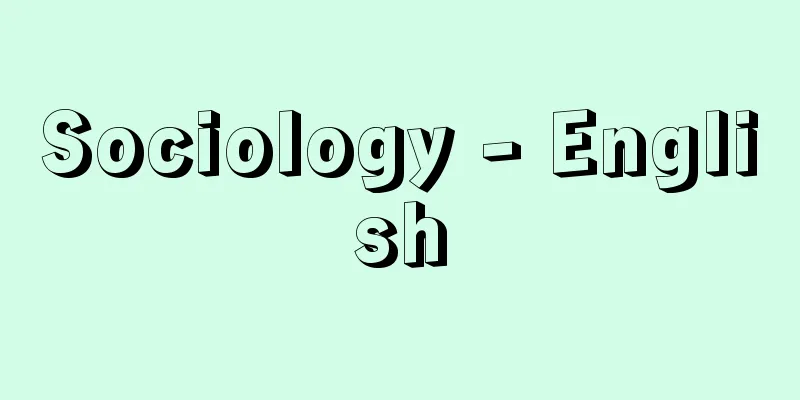Sociology - English

|
It is a branch of social science that uses unique concepts and methods to theoretically and empirically investigate the structure and function, change and development of society (including culture) in relation to human social behavior, clarifying the laws that permeate historical and social reality, and thereby contributing to the resolution of real-world problems. [Akira Hamashima] The nature and field of sociologyIn the broadest sense, sociology can be said to be a discipline that studies human social life from the perspective of community of life, but when it comes to what exactly human social life and community of life are, the definition is vague and incoherent, so unless the meaning is clarified, the discipline cannot maintain its originality. Meanwhile, social life has various functional fields (such as economy, politics, law, education, religion, and other areas of life), which are related to each other by structural principles that permeate the entire society at any given time, and which form a unified whole. In addition, a wide variety of groups and institutions are formed through each field as a means of satisfying needs, and while they form the core of the social structure in a complex way with human actions, they also undergo constant change in the process of responding to various internal and external conditions. Therefore, sociology in the narrower sense empirically investigates the relationship between elementary human actions and society as a whole, using groups and institutions as intermediate terms, organically integrating element analysis and mechanism analysis, and based on this empirical investigation of the actual situation, seeks to clarify the structure of society, including actions, groups, and institutions, and the laws that govern its changes, in order to solve real-life problems. To address this issue, sociology conducts research in three separate divisions: behavioral theory (human theory), structural theory, and change theory. Of course, the research fields of these three divisions are closely and inseparably related to each other. [1] In the theory of action (human theory), human beings, the elemental units that make up society, and their social actions are analyzed. Human beings feel, think, and act according to their inner desires and motivations, but at the same time, they do so primarily under the guidance of the group to which they belong and its norms or social expectations. Thus, when satisfying their desires, human beings are channeled through common value systems, norms, and institutions, and in the process of fulfilling the roles expected of them by others, they internalize these and are socially shaped. At the same time, as the agents of action, human beings act back on their surroundings, forcing changes on society, groups, and institutions. The task of the theory of personhood and the theory of action is to analyze such human beings and their social actions. [2] Next comes the analysis of social structure. Social structure is made up of various elements, but it can be broadly divided into groups and institutions. (1) Social relations and actions that humans create are carried out both inside and outside of groups of various sizes, but the task of group theory is to clarify the structure and functions of various groups, such as basic groups such as families, villages, and cities, functional groups such as schools, companies, and nations, as well as the relationships between groups, such as crowds, the public, the masses, classes, strata, and ethnic groups. Group research has been a central field in sociology up until now. (2) It is no less important to analyze the systems of values, norms, and institutions that apply to these groups and to society as a whole in relation to human behavior and groups. This field is, so to speak, the cultural aspect of society, and norms and institutions as standardized patterns of behavior, and the role expectations and social controls that accompany them, play a role as a mediating link that connects people with groups or society, and act to reinforce the social structure from within, so institutional theory is no less important than group theory. [3] The third field is social change theory, which has the task of analyzing changes in the aforementioned groups and institutions, or in the structure of society as a whole. In a society as rapidly changing as ours, it is safe to say that it is impossible to understand social life without elucidating the causes, process, and results of changes in individual groups and organizations, and ultimately in society as a whole, such as industrialization, the enlargement of organizations (bureaucratization), urbanization, and the nuclearization of families. At the same time, it is also an important task of change theory to trace the historical development of human society from a more macroscopic perspective, to determine how to position modern society within the trends and directions of that change, and to consider how to envision the future. [Akira Hamashima] The uniqueness of sociological knowledge and the social sciencesAs mentioned above, the task of sociology is to examine the relationship between humans (behavior) and society through groups and institutions. However, since each human being living in society has to directly or indirectly be involved with various groups and institutions across various areas of life in order to satisfy his or her desires, the subjects are necessarily wide-ranging and it becomes necessary to analyze all areas of social life. As a result, the subjects of sociology are diffused and it is difficult to clearly define a specific subject. This has been the cause of the ambiguity of the academic field of sociology. However, even if the subject is not specified, the academic field can be established by the unique method of approaching the subject. The uniqueness of this method lies in the fact that it empirically studies the relationship between humans and society mediated by groups and institutions, delving into the microscopic dimension of human consciousness and behavior, while also tracing back to the macroscopic dimension of social structure and change. However, if we think about it carefully, the fact that the subject is not clear at first glance is not only true for sociology but also for other social sciences. This is because the various areas of social life (economy, politics, education, religion, etc.) are actually closely interdependent and interpenetrating, and cannot be separated from one another, so there are inevitably overlapping areas. The traditional approach has been to artificially partition these areas for convenience, and to make them the territories of economics, politics, education, religion, etc. Therefore, the approach of sociology, which conducts research mainly on groups, systems, and actions that span each area, inevitably overlaps with other social sciences in terms of subject matter. This is why the question of how sociology differs from other social sciences becomes an issue. However, the various areas of social life that are the subject matter are the common property of all social sciences, and the issue must be said to lie in the uniqueness of the methodology that approaches this subject matter. While other social sciences study their respective fields in a vertical manner, sociology studies each field horizontally and analyzes the groups, institutions, and actions that operate within them. Due to its unique methodological approach, sociology occupies a somewhat unique position in that, while it is an individual, specialized branch of the social sciences, it at the same time aims for a general, comprehensive understanding that spans all fields. [Akira Hamashima] History of Sociology
[2] However, as the social sciences became more specialized, the crudeness of social theories that explained things by analogy with biological organisms and the emptiness of their encyclopedic content were criticized, and comprehensive sociology went bankrupt. There was a growing movement to establish sociology as a specialized, specialized science. This movement followed a trend of switching the explanatory principle of society from biology to psychology, and after Tarde in France, who tried to explain social phenomena by the "law of imitation," sociology based on a psychological approach became influential. The Americans Giddings, Small, and Cooley, and the British Hobhouse, belonged to this trend, but the formal sociology of Germany's Simmel, Vierkant, and Wiese was particularly representative of sociology in the early 20th century. This school of sociology is called formal sociology because it separated the unique subject of sociology from the content of society (economy, politics, education, religion, etc.) and sought the common forms of socialization (social processes or social relations such as hierarchical relationships, conflict, competition, and division of labor) that are found in society. In this case, they performed a thorough psychological grasp of social processes and social relations, focusing on the mental interactions between people, and succeeded in establishing sociology as a specialized science. However, by focusing too much on psychology in the pursuit of forms of socialization, they fell into abstract, unproductive theoretical thinking, and became detached from reality. [3] However, even at that time, we cannot ignore the brilliant achievements of the German M. Weber, who pursued the meaning and correlation of human actions and conducted comparative research on economy, politics, religion, and so on throughout history and around the world, and the achievements of the Frenchman Durkheim, who inherited the tradition of synthetic sociology and advocated sociologicalism. On the other hand, as a reaction against formal sociology, the movement to give sociology more concrete content and make it a practical, real science grew stronger from the 1930s onwards, and in Germany, under the influence of the materialist conception of history, the sociology of knowledge (Mannheim, M. Scheler, A. Weber, etc.), which had a strong historical philosophical coloring, emerged, while in the United States, functionalist sociology, which grasps society and culture as they are in their entirety and studies them empirically, became influential through exchanges with cultural anthropology. [Akira Hamashima] Trends in Contemporary SociologyIn modern times, especially since the end of World War II, sociology has undergone diverse developments and is now in a completely different state than it was before. [1] Sociology after World War II was characterized by the advancement of American sociology in place of the decline of European sociology, which had previously held a leading position. At the same time, international exchange and cooperation in sociology, centered around the International Union of Sociological Associations, became more active under the umbrella of the United States, while in the former Soviet Union and other socialist countries, where sociology had traditionally been viewed as heretical, research was actively pursued under the name of "concrete sociological research," and international exchange began to take place. [2] The dominance of American sociology encouraged a shift from the traditional academic field of abstract theory to one that emphasized concrete, empirical surveys and research. This was due to the increased sophistication of social research techniques (especially experimental and statistical-mathematical methods) that had been developed since around 1930. This trend, combined with pragmatism, gave rise to a climate of operationalism and natural scientism, and promoted the development of mathematical sociology, which deals with and manipulates various social phenomena mathematically. [3] At the same time, there has been a noticeable trend toward practical application aimed at solving or adjusting various real-world problems, and sociological science has taken on a strong character as a practical applied science or sociotechnical science, combining with policy science, management science, behavioral science, and information science. In order to deal with the deepening alienation of people caused by technology, organization, and mass communication, and the rapid changes and disintegration or increase in pathological phenomena in social life that accompany industrialization, urbanization, and mobility, there has been remarkable development in fields that apply sociological knowledge and technology to improve welfare, such as corporate labor management, community organization, measurement and prediction of consumption and voting behavior, formulation of various comprehensive social plans, and setting of social indicators. [4] In relation to this, there has been growing interest in the problems facing modern sociology (such as stratification and mobility, mass society and mass communication, bureaucratic organizations and humans, small groups and leadership, social change and social planning, etc.), and there has been a rise in theories of modern society, including futurology, that are mainly derived from theories of modernization and technocracy (such as the industrial society theory of Aron et al., the post-industrial society theory of Bell and Touraine, the information society theory, the knowledge society theory of Drucker et al., and the managed society theory of Marcuse et al.). The underlying theme of these theories is the convergence theory, which claims that capitalism and socialism are becoming increasingly similar, and as can be seen from this, the influence of Marxism is declining (the so-called end of ideology). [5] On the other hand, the research field of sociology has expanded and diversified more than ever before, and now covers almost all aspects of social life. However, within each research field, there is a remarkable tendency toward specialization and fragmentation, making it increasingly difficult to see the whole picture of sociology. There is also a tendency to fall into trivial empiricism, non-ideological technocracy, and mistaken research supremacy. Good examples of this include Merton's proposal of "middle-range theory," Homans's presentation of a unified theoretical scheme based on a huge amount of data, mainly from small group studies, Blau's development of exchange theory, Parsons' construction of a structural-functionalist theory of social systems, and the proposal of a phenomenological approach (especially the insistence on an interpretive paradigm) by A. Schutz and H. Blumer, who opposed Parsons' normative paradigm. [6] On the other hand, contrary to the specialization and fragmentation, it cannot be ignored that exchanges and cooperation with adjacent sciences (so-called interdisciplinary research) have become more active, and that new integrated sciences such as human sciences and behavioral sciences are being born, particularly in close cooperation with social psychology, cultural anthropology, and other social sciences (and some natural sciences). These are different from the theoretical system and concerns of Marxism, which is the traditional integrated social science, and for that reason there is a basis for debate between the two. [Akira Hamashima] Issues in modern sociologyThe challenge facing modern sociology is, first and foremost, to return to the origin of what sociology is for, and to develop theories and techniques to improve human welfare, not simply to whitewash the status quo or to use techniques of top-down control and manipulation, by grasping the facts of the relationship between humans and society in collective settings such as family, community, school, workplace, and nation, based on the awareness of the problem of how to liberate humanity from the increasingly severe situation of controlled social alienation. The sharp question that Lind once posed, "What is knowledge for?", is being revived today in radical trends such as Goldner's sociology of self-reflection. On the other hand, sociology needs to seriously consider what it can offer to the movement known as the participatory revolution, which seeks to humanize labor, management, and society through bottom-up participation in management and politics, and to realize self-management and self-determination. This calls for a shift to a new discipline that is neither an ideological theory of technology nor an operational theory of systems. This also leads to the question of how to overcome, both theoretically and practically, the problems once raised by social science masters Marx and M. Weber. From this perspective, it can be said that sociology is expected to establish theories about the structure and change of society, and to provide a scientific outlook for the future and the means to realize it. [Akira Hamashima] "Lectures on Sociology" by Shimizu Ikutaro (1950, Iwanami Shoten)" ▽ "Principles of Sociology" by Iwai Hiroyuki (1972, Kobundo)" ▽ "Lectures on Sociology, supervised by Fukutake Nao, all 18 volumes (1972-76, University of Tokyo Press)" ▽ "Modern Sociology Series 13: Social Theory and Functional Analysis" by R.K. Merton, translated by Mori Togo et al. (1969, Aoki Shoten)" ▽ "Modern Sociology Series 14: Social Systems Theory" by T. Parsons, translated by Sato Tsutomu (1974, Aoki Shoten)" ▽ "Sociology, 2nd edition, edited by Fukutake Nao and Hamashima Akira (1979, Yuhikaku)" [Reference items] | |Source: Shogakukan Encyclopedia Nipponica About Encyclopedia Nipponica Information | Legend |
|
社会(文化をも含め)の構造と機能、変動と発展を人間の社会的行為とかかわらせながら、固有の概念・方法を用いて理論的・実証的に究明し、歴史的・社会的現実を貫く法則を明らかにして、現実の諸問題の解決に寄与しようとする社会科学の一部門をいう。 [濱嶋 朗] 社会学の性格と研究分野ごく広い意味では、社会学は生活の共同という観点から人間の社会生活を研究する学問であるといえるが、人間の社会生活とか生活の共同とはなにかということになると、漠然としてとりとめがないから、その意味をはっきりさせない限り、学問の独自性を保ちえない。ところで、社会生活にはさまざまな機能分野(経済、政治、法、教育、宗教などの生活領域)があり、それらの分野はそのときどきの社会全体を貫く構造原理によって互いに関連づけられ、全体として一つのまとまりを示している。また、各分野を通じて多種多様な集団や制度が欲求充足の手段として形成され、人間の行為と複雑に絡みながら社会構造の中核部分を形づくる一方、内外の諸条件に対応する過程で絶えず変動を遂げていく。そこで、もっと狭い意味での社会学は、集団や制度を媒介的中間項として、要素的な人間の行為と全体的な社会とのかかわり合いを、要素分析と機構分析を有機的に統合しつつ実証的に究明し、この実証的な現実の実態究明に基づいて、行為、集団、制度をひっくるめた社会の構造とその変動を貫く法則を明らかにして、現実の社会生活上の諸問題を解決しようとする。 この課題を解決するために、社会学は行為論(人間論)、構造論、変動論の3部門に分かれて研究を進めるが、もちろんこの3部門の研究分野は相互に密接不可分に関連している。 〔1〕行為論(人間論)においては、社会を構成する要素的な単位である人間とその社会的行為が分析される。人間はその内的な欲求や動機につき動かされて感じ、考え、行動するが、同時にそれはおもに、人間が所属している集団やその規範または社会的期待のもとで行われる。したがって人間は、その欲求充足に際して共通の価値体系や規範・制度に水路づけられ、他から期待された役割を遂行する過程で、それを内面化し、社会的に形成される。その一方で、人間は行為の主体者として周囲に働き返し、社会や集団や制度に変容を強いる。人間論(パーソナリティー論)や行為論の任務は、そのような人間とその社会的行為を分析するところにあるといえる。 〔2〕次に社会構造の分析があげられる。社会構造はさまざまな要素からなるが、集団と制度に大別される。 (1)人間の織り成す社会関係や行為の行われる場面は、大小さまざまの集団の内外においてであるが、家族・村落・都市などの基礎集団、学校・企業・国家などの機能集団、さらには群集・公衆・大衆・階級・階層・民族といった各種の集団の構造と機能、および集団相互間の関係を明らかにするのが、集団論の課題である。集団研究は、これまで社会学の中心的分野をなしていた。 (2)これらの集団やひいては全体社会に通用する価値、規範、制度の体系を、人間の行為や集団との関係で分析することも、それに劣らず重要な課題である。この分野は、いわば社会の文化的側面にあたり、標準化された行為様式としての規範や制度、それに伴う役割期待や社会統制が、人間と集団ないしは社会をつなぐ媒介環としての意味を担い、社会構造を内側から補強する働きをしているので、制度論も集団論に劣らず重要である。 〔3〕第三の分野は社会変動論であるが、これは前述の集団や制度、あるいは全体社会の構造そのものの変動を分析する任務をもつ。とりわけ現代のように変動の激しい社会では、産業化、組織の巨大化(官僚制化)、都市化、核家族化などといった個々の集団や組織、ひいては社会全体の変化の原因、経過、結果を解明することなしに社会生活を理解できないといってよい。それとともに、よりマクロな観点から人類社会の歴史的発展を跡づけ、その変化の趨勢(すうせい)や方向のなかに現代社会をどう位置づけ、将来をどう展望するかも変動論の重要な課題をなしている。 [濱嶋 朗] 社会学的認識の独自性と社会諸科学以上のように、集団や制度を媒介としながら人間(行為)と社会とのかかわり合いをみていくのが、社会学の課題であるが、社会生活を送る個々の人間は、その欲求充足の必要上さまざまな生活領域にまたがる各種の集団や制度に直接間接かかわらざるをえないから、その対象もいきおい広範多岐にわたり、社会生活の全分野について分析する必要が出てくる。そのため、社会学の対象は拡散し、固有の対象を明確に限定しにくい。そのことが社会学という学問のあいまいさの原因となってきた。しかし、対象は特定されなくても、対象に迫る方法の独自性によって学問は成立しうる。この方法の独自性は、集団と制度に媒介された人間と社会とのかかわり合いを、人間の意識や行動というミクロな次元にまで掘り下げる一方、社会の構造と変動というマクロな次元にまでさかのぼりながら実証的に研究していくところにある。 しかし、よく考えてみると、対象が一見はっきりしないのは、社会学に限らず他の社会諸科学にも当てはまる。というのは、社会生活の各領域(経済、政治、教育、宗教など)は、実際には密接に依存し浸透しあっていて、相互に切り離しえないから、どうしても重なり合う部分を生じるためである。それらの各領域を便宜上、人為的に間仕切りして、経済学、政治学、教育学、宗教学などの縄張りとするのが、これまでの伝統的な行き方であった。そのため、各領域にまたがる集団、制度、行為を中心に研究を進める社会学のアプローチは、どうしても他の社会諸科学と対象の点で重なり合うことになる。社会学と他の社会諸科学とがどう違うのかが問題になるのは、そのような事情による。しかし、対象である社会生活の諸分野は、あらゆる社会諸科学の共有財産なのであり、問題はこの対象に迫る方法の独自性にあるといわなければならない。他の社会諸科学はそれぞれの領域を縦割りにして研究するのに対し、社会学は各領域を横割りにして、そこに働く集団、制度、行為を分析するという方法上の独自性から、社会学は社会諸科学の個別的、専門的な一部門でありながら、しかも同時に各領域にわたる一般的、総合的な認識を目ざすという、一種独特な位置を占めることになる。 [濱嶋 朗] 社会学の歴史
〔2〕しかしその後、社会諸科学の専門化が進み、生物有機体になぞらえて説明する社会理論の粗雑さと百科全書的な内容の空疎さが批判されて、総合社会学は破産し、専門的な特殊個別科学としての社会学を確立しようとする動きが強まった。この動きは、社会の説明原理を生物学から心理学に切り替える方向をたどり、社会現象を「模倣の法則」によって説明しようとするフランスのタルドを経て、心理学的方針にたつ社会学が有力になった。アメリカのギディングス、スモール、クーリー、イギリスのホッブハウスらがこの流れに属するが、とりわけドイツのジンメル、フィーアカント、ウィーゼらの形式社会学が、20世紀初頭の社会学を代表するものであった。この派の社会学が形式社会学とよばれるのは、社会学の独自の対象を社会の内容(経済、政治、教育、宗教など)から切り離し、そこに共通にみられる社会化の形式(上下関係、闘争、競争、分業などの社会過程ないしは社会関係)に求めたからである。その場合、人々の間の心的相互作用を中心に社会過程や社会関係の徹底した心理学的把握を行い、それによって社会学を一個の専門科学として確立することに成功した。しかし、心理学に徹して社会化の形式を追うあまり、抽象的で生産性に乏しい空理空論に陥り、現実から遊離する結果になった。 〔3〕もっともそのころにも、人間の行為の意味連関を追究して、古今東西にわたる経済、政治、宗教などの比較研究を行ったドイツのM・ウェーバーの輝かしい業績や、総合社会学の伝統を受け継ぎ社会学主義を唱えたフランスのデュルケームの業績を無視するわけにはいかない。他方、形式社会学への反動から、社会学にもっと具体的な内容を与え、実践に役だつ現実科学にしようとする気運が20世紀の30年代以後に強まり、ドイツでは唯物史観の影響下で歴史哲学的な色合いの濃い知識社会学(マンハイム、M・シェラー、A・ウェーバーら)が出現し、アメリカでは文化人類学との交流から、社会や文化のありのままの姿を全体関連的にとらえ、実証的に研究する機能主義の社会学が有力になった。 [濱嶋 朗] 現代社会学の動向現代に入って、とくに第二次世界大戦後、社会学は多彩な展開を遂げ、これまでとはまったく様相を異にするに至っている。 〔1〕第二次大戦後の社会学は、これまで指導的な地位を占めていたヨーロッパ社会学の地盤沈下にかわるアメリカ社会学の躍進によって特徴づけられる。と同時に、アメリカの傘の下で国際社会学会連合を中心とする社会学の国際的な交流と協力が盛んになる一方、従来社会学を異端視してきた旧ソ連その他社会主義国においても「具体的社会学的調査」の名のもとに研究が積極的に進められ、国際的交流がみられるようになった。 〔2〕アメリカ社会学の優位は、従来の抽象的な理論一辺倒の学問から具体的、実証的な調査・研究を重視する傾向を促した。これは、1930年ごろから発達してきた社会調査の技法(とくに実験的・統計数理的方法)がいっそう精密化したためである。この傾向は、プラグマティズムと結び付いて操作主義や自然科学主義の風潮を生み、種々の社会現象を数理的に処理し操作する数理社会学の展開を促した。 〔3〕それとともに、現実の諸問題の解決または調整を目ざす実用化の傾向が目だち、政策科学や管理科学、行動科学や情報科学と結び付いて実践的な応用学ないしは社会技術学としての性格を強く帯びるようになっている。技術、組織、マス・コミュニケーションなどによる人間疎外の深化、産業化・都市化・流動化に伴う社会生活の急激な変化と解体ないしは病理現象の増大に対処すべく企業の労務管理、コミュニティの組織化、消費行動や投票行動の測定と予測、各種の総合的社会計画の策定、社会指標の設定など社会学的知見や技術を応用化して福祉の向上に役だてようとする分野の発達が目覚ましい。 〔4〕これと関連して、現代社会学が当面する諸問題(たとえば、成層と移動、大衆社会とマス・コミュニケーション、官僚制的組織と人間、小集団とリーダーシップ、社会変動と社会計画など)への関心が高まり、また、未来学を含めておもに近代化論やテクノクラシー論の流れをくむ現代社会論(アロンらの産業社会論、ベルやトゥレーヌの脱工業社会論、情報化社会論、ドラッカーらの知識社会論、マルクーゼらの管理社会論など)の盛行をみている。その基調は、資本主義と社会主義がますます似通ってくるとする収斂(しゅうれん)理論であり、またそこにもうかがえるように、マルクス主義の影響力の低下(いわゆるイデオロギーの終焉(しゅうえん))も否めない。 〔5〕一方、社会学の研究分野はこれまでになく拡大し多様化して、社会生活のほとんど全面にわたるようになったが、それぞれの研究分野のなかでも専門化と細分化の傾向が著しく、社会学の全容はますます見通しがきかなくなりつつある。また、瑣末(さまつ)な経験主義や没イデオロギー的な技術主義、誤った調査至上主義に陥る傾向もみられる。マートンの「中範囲の理論」の提唱、ホマンズによる主として小集団研究の膨大なデータからの統一的理論図式の提出、ブラウらの交換理論の発展、パーソンズらによる構造機能主義的な社会システム論の構築、同じくパーソンズの規範パラダイムに対抗するA・シュッツ、H・ブルーマーらによる現象学的なアプローチの提唱(とくにその解釈パラダイムの主張)などが、そのよい例である。 〔6〕他方、専門化と細分化とは裏腹に、隣接諸科学との交流と協力(いわゆる学際的研究)が一段と活発化し、とくに社会心理学や文化人類学その他の社会諸科学(一部は自然諸科学)と緊密に提携しながら、人間科学や行動科学という新しい総合科学が生まれつつあることも無視できない。これは、従来の総合的社会科学であるマルクス主義の理論体系や問題意識とは異質のもので、それだけに両者の間に論争が展開される素地をもっている。 [濱嶋 朗] 現代社会学の課題現代社会学が当面する課題は、まずなによりも、なんのための社会学かという原点に立ち返り、深刻化しつつある管理社会的疎外状況からどうしたら人間性を解放できるかという問題意識のもとに、家族、地域、学校、職場、国家などの集団場面における人間と社会とのかかわり方を事実に即してとらえ、単なる現状の糊塗(こと)でも上からの管理や操作の技術でもなく、人間の福祉を向上するための理論と技術を発展させるところにある、といってよいであろう。かつてリンドが「なんのための知識か」と提起した鋭い問いかけは、今日ゴールドナーの自己反省の社会学をはじめとするラディカルな潮流のなかに、よみがえりつつある。 他方、参加革命といわれるように、経営や政治などへの下からの参加によって、労働や管理や社会を人間化し、自主管理と自己決定を実現しようとする運動に対して社会学はなにを提供できるのか、が深刻に反省される必要がある。このことは、没イデオロギー的技術論でも操作的システム論でもない新しい学問への脱皮を要求する。このことはまた、社会科学の巨匠であるマルクスとM・ウェーバーがかつて提起した問題を、理論的にも実践的にもどう乗り越えるか、という社会科学全体の問題につながる。そうした観点から、社会の構造と変動についての理論を打ち立て、将来の科学的展望とその実現手段を提供する姿勢が、社会学に望まれているということができる。 [濱嶋 朗] 『清水幾太郎著『社会学講義』(1950・岩波書店)』▽『岩井弘融著『社会学原論』(1972・弘文堂)』▽『福武直監修『社会学講座』全18巻(1972~76・東京大学出版会)』▽『R・K・マートン著、森東吾他訳『現代社会学大系13 社会理論と機能分析』(1969・青木書店)』▽『T・パーソンズ著、佐藤勉訳『現代社会学大系14 社会体系論』(1974・青木書店)』▽『福武直・濱嶋朗編『社会学』第2版(1979・有斐閣)』 [参照項目] | |出典 小学館 日本大百科全書(ニッポニカ)日本大百科全書(ニッポニカ)について 情報 | 凡例 |
<<: Sociological jurisprudence
Recommend
Kumano faith - Kumano faith
The faith, centered on the Kumano Sanzan, became ...
General check with lines - General check with lines
…This system was developed to prevent the risk of...
Grewia biloba var. parviflora (Bunge) Hand.‐Mazz.
A deciduous shrub of the Tilia family rarely culti...
Mother ship fishing - mother ship fishing
A fishing operation style in which several or sev...
Hornung, E. (English spelling) HornungE
...The view that sees the pharaoh as a typical ex...
Uchimurasaki - Uchimurasaki
…A citrus fruit that is an evergreen tree in the ...
Shimane Peninsula
A peninsula facing the Sea of Japan in northeas...
quarter-wave potential
…The time τ from the start of electrolysis to the...
Residence - Izumau
〘Self-Ha 4〙 (also "isumau") To straighte...
Amida
…In the Middle Ages, it was common to use the cha...
miosis
...developmentally, the iris, which exists as a t...
Autobrecciated lava
The broken parts of lava flow that occur during it...
Ruzicka
A Swiss organic chemist of Slavic descent, born i...
Lack of willpower
… Voluntarism [Kida Gen] [Willpower disorder] One...
Lifesaving measures - lifesaving measures
...The stages of resuscitation can be divided int...









